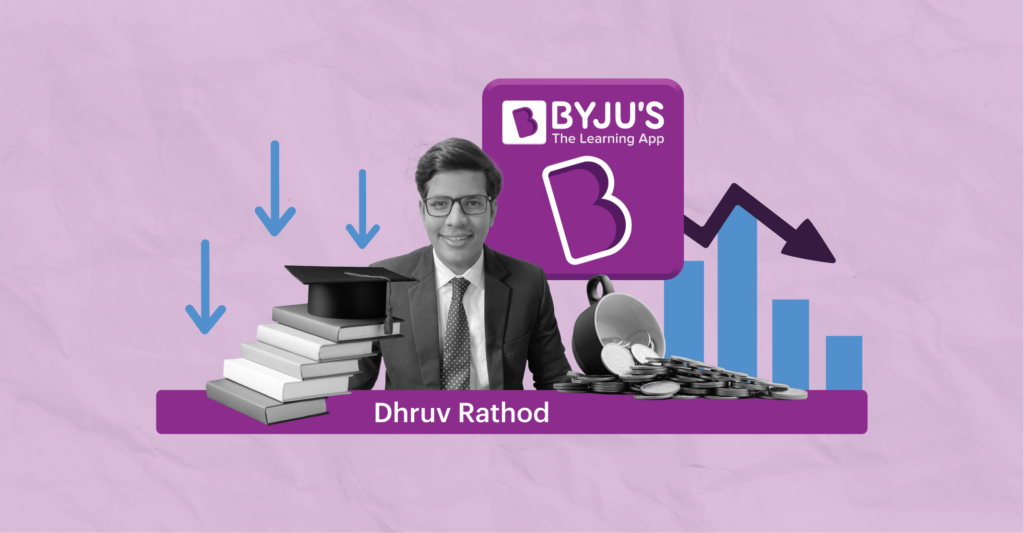Last Updated on Dec 19, 2022 by
I learned this basic thumb rule of mathematics in my primary school – when two negatives meet, they are added, but the sign remains negative. Many Indian startups learn this the hard way by acquiring other loss-making startups and creating bigger losses for investors. In this article, let’s learn about one such Ed Tech startup, none other than Byju’s.
Many people have spoken about the acquisitions done by Byju’s like Great Learning (for $600 mn), White Hat Junior (for $300 mn), Aakash Educational Services (for $1 bn) and the list continues. But there is something more important than these acquisitions.
Before jumping into it, let’s understand how Ed Tech platforms gained demand.
Table of Contents
Why was there a need for Ed Tech platforms?
Any industry you work in has become excessively competitive, and everyone wants to make their kid the ‘perfect’ kid. In this race, many parents have forgotten that every kid is special individually. We all have heard this amazing quote by Albert Einstein “Everybody is a genius. But if you judge a fish by its ability to climb a tree, it will live its whole life believing it is stupid.” Little do we go by this quote. Hence the need for a platform that helps students memorise content began.
During the Covid-19 lockdown, the offline mode of education was impossible, and students were not serious about the online mode of education, which eventually affected their learning. This gave raise to platforms like Byju’s, which provides engaging content for the students.
How do Byju’s convince parents to pay such huge amounts?
It has become a misconception that if a student does not score well in school and college, they are worth nothing. Ed Tech platforms use this misconception to scare uninformed parents and make money from them. Byju’s is not to be blamed for this fire, but it has added fuel to this fire.
According to an article by TFIpost, “It is a tactic of the ed-tech company that they ask children difficult questions which ultimately leads to the inability of the students in answering them.”
So after a student takes these tests, a series of cold calls are started, and every sales manager runs behind the parents to enrol their kids into the Edtech platform for a better future. Most of the parents are left out with no choice other than enrolling.
Financial disclosures of Byju’s
In July 2022, Karti Chidambaram, a member of the Lok Sabha, called Byju’s accounting irregular and stated that when the firm has such huge layoffs, it is very clear that they are not in a sound state of financial health. Mr Chidambaram has written a letter to the ICAI (Institute of Chartered Accountants of India) to check the company’s books. The lawmaker has urged the institute to investigate the company’s financial statements. However, Chidambaram has highlighted some red flags in its financial statements for FY 2021. He pointed out that these statements are 18 months late, “nearly missing four deadlines.”
The minister has commented on a part where Byju’s stated 81% of the revenues in FY 2021 came from the sale of Edu Tech products. He questioned this model, stating, “Is it not a blatant misinterpretation of facts to classify hardware products as EduTech.”
He also specified that the company has shown 60% of its employee costs as capital expenditure is expensed on the profit and loss, show losses of about Rs. 5,000 cr.
Also, the firm has violated revenue recognition policies. It is a standard practice that revenue should be recognised upfront. In the case of a subscription, it should be recognised when the service is being provided.
For example, if you buy a subscription to any OTT platform, you pay the subscription fees in advance but use the service for at least three months. So the company has received the money from you and can recognise it only after the period gets over. If you have used 50% of the subscription time (1.5 months), in this case, the company will recognise 50% as the remaining 50% of the service is yet to be provided.
Why is human capital not used efficiently?
Over time, many employees refused to work with Byju’s and have come out to speak about their work culture. As per the employees, Byju’s promises Rs. 10-12 lakh per annum salary to people, and after joining, they undergo vigorous training. However, the salary during training is Rs. 15,000-20,000, which is based on attendance and the number of hours given for calling the parents. The employees are given a particular target to call parents multiple times from databases and convince them that their kid gives an exam. To convert their jobs to full-time, they have to sell the course to a certain number of students in a particular period.
Due to this hard selling, the NCPCR (National Commission for Protection of Child Rights) has summoned Byju Raveendran, CEO of Byjus. The NCPCR statutory body chairperson Priyanka Kanoongo has stated in a media interaction that they have summoned the CEO of the Ed-tech giant because of guideline violations. The summon has been due to a claim in a media article by several parents who stated they had been defrauded by K12 online tutoring by taking away their life savings and ensuring a bright future for their kids, but it was the opposite.
According to an article in the Economic Times, “The commission has asked Raveendran to appear in person before 2 PM on 23 December 2022 to respond to the allegations. It also instructed him to provide details of all the courses run by Byju’s for children, the structure of the courses, fee details, number of students enrolled in courses, refund policy, legal documents recognising Byju’s as a valid ed-tech company, and other documents, during his appearance.”
Conclusion
While it has already been tough for most students to compete in the external environment, it would be great if platforms like Byju’s would make education more practical so that students understand what they are learning. Though Byju’s did not create this system, it can be a platform for making this education better and more practical. There is a huge demand for such platforms that will help India to bridge the gaps and increase the skills of the youth. The youth is our hope to go towards a $5 tn economy.
Covid, everyone remembers the lockdown. Offline mode of education was not possible, and students had started to ignore studies in the online mode, and their learning suffered. This again increased the demand for a platform like Byjus to instruct students through videos and content.
- Sovereign Gold Bonds (SGBs) – A Smart Alternative to Gold Exposure - Jul 12, 2024
- Navigating the Debt Trap: Lessons from Business Failures - May 30, 2024
- Utility of Wealth in Gen Z and Their Spending Patterns - Apr 30, 2024




